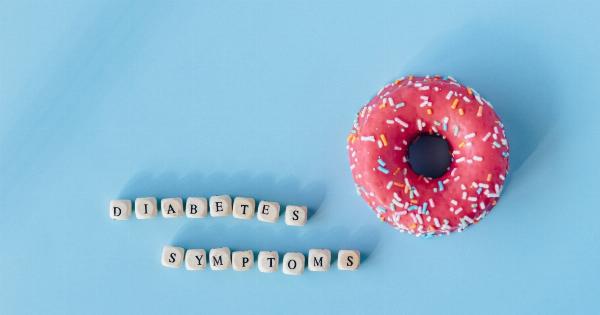High blood sugar, also known as hyperglycemia, occurs when there is an excess of glucose (sugar) in the bloodstream. This condition is commonly associated with diabetes, but it can also occur in individuals who do not have diabetes.
High blood sugar can cause a range of symptoms, from mild to severe. It is important to know the signs of high blood sugar so that you can take steps to manage it.
1. Increased Thirst
One of the most common symptoms of high blood sugar is increased thirst. When blood sugar levels are high, the kidneys work harder to filter the glucose out of the blood and excrete it in the urine.
This process can lead to dehydration, which can make you feel thirsty.
2. Frequent Urination
Another sign of high blood sugar is frequent urination. As mentioned, the kidneys work harder to filter the glucose out of the blood and excrete it in the urine. This can lead to an increased need to urinate, even during the night.
3. Fatigue
High blood sugar can cause fatigue, or a feeling of low energy. This may be due to the body’s inability to properly use glucose as a source of energy, or to the body’s efforts to remove excess glucose from the bloodstream.
4. Blurred Vision
When blood sugar levels are high, the glucose can build up in the lens of the eye, leading to blurred vision. This condition is often temporary and can be resolved once blood sugar levels are back to normal.
5. Slow Healing of Wounds
High blood sugar can impair the body’s ability to heal wounds. This is because glucose in the bloodstream can cause damage to blood vessels, which can lead to poor circulation to the affected area.
Poor circulation slows down the healing process and can increase the risk of infection.
6. Increased Hunger
When blood sugar levels are high, the body may not be able to properly use glucose as a source of energy. This can cause an increased feeling of hunger, even after eating.
7. Dry Mouth
High blood sugar can cause a dry mouth, which can lead to a feeling of thirst. This may be due to the body’s increased need for water to excrete excess glucose in the urine.
8. Numbness or Tingling in the Hands or Feet
High blood sugar can cause damage to nerves over time, leading to a condition known as diabetic neuropathy. This can cause numbness or tingling in the hands or feet, as well as other parts of the body.
9. Mood Changes
High blood sugar can cause mood changes, such as irritability, anxiety, or confusion. This may be due to the body’s inability to properly use glucose as a source of energy, or to the effects of dehydration.
10. Fruity Breath
When blood sugar levels are high, the body may begin to break down fat for energy. This process can lead to the production of ketones, which can cause a fruity odor on the breath.
Conclusion
High blood sugar can cause a range of symptoms, from mild to severe. If you experience any of the symptoms listed above, it is important to speak with your healthcare provider to determine the cause.
High blood sugar can be managed with lifestyle changes, such as dietary modifications and exercise, or with medication in severe cases.





























